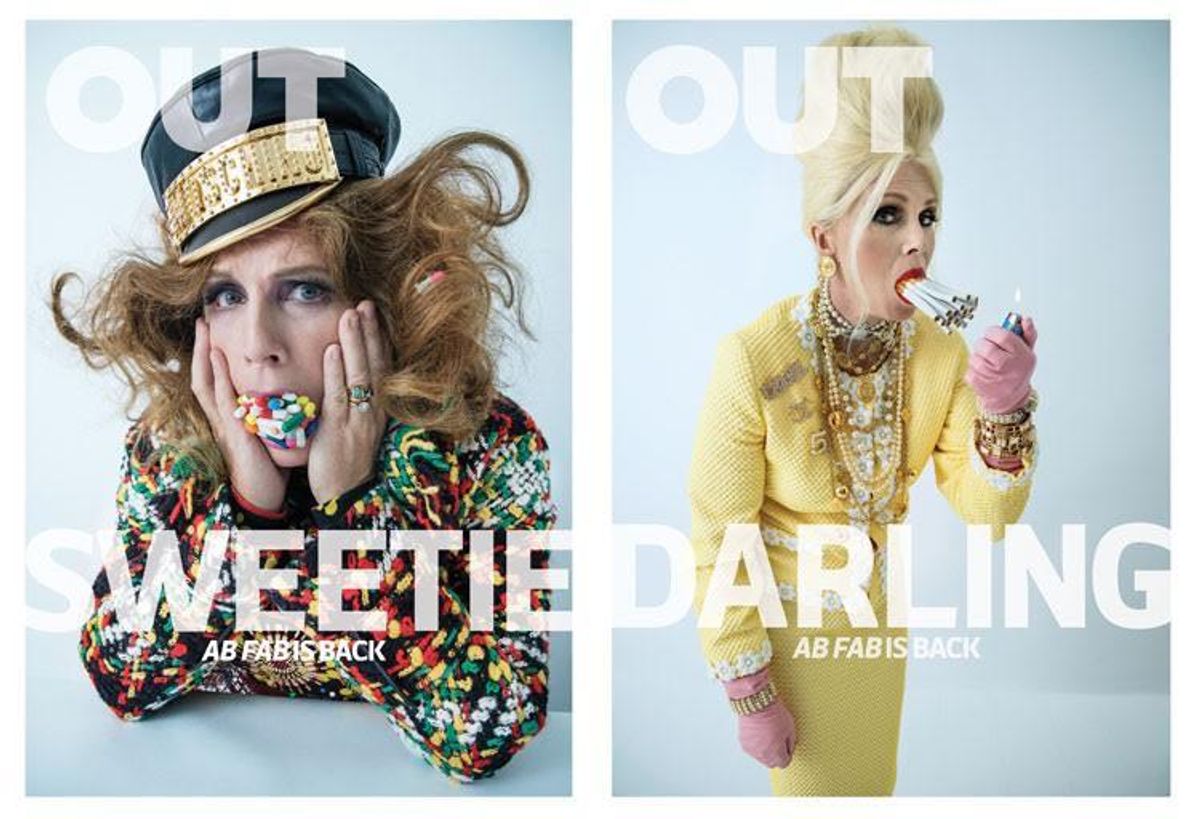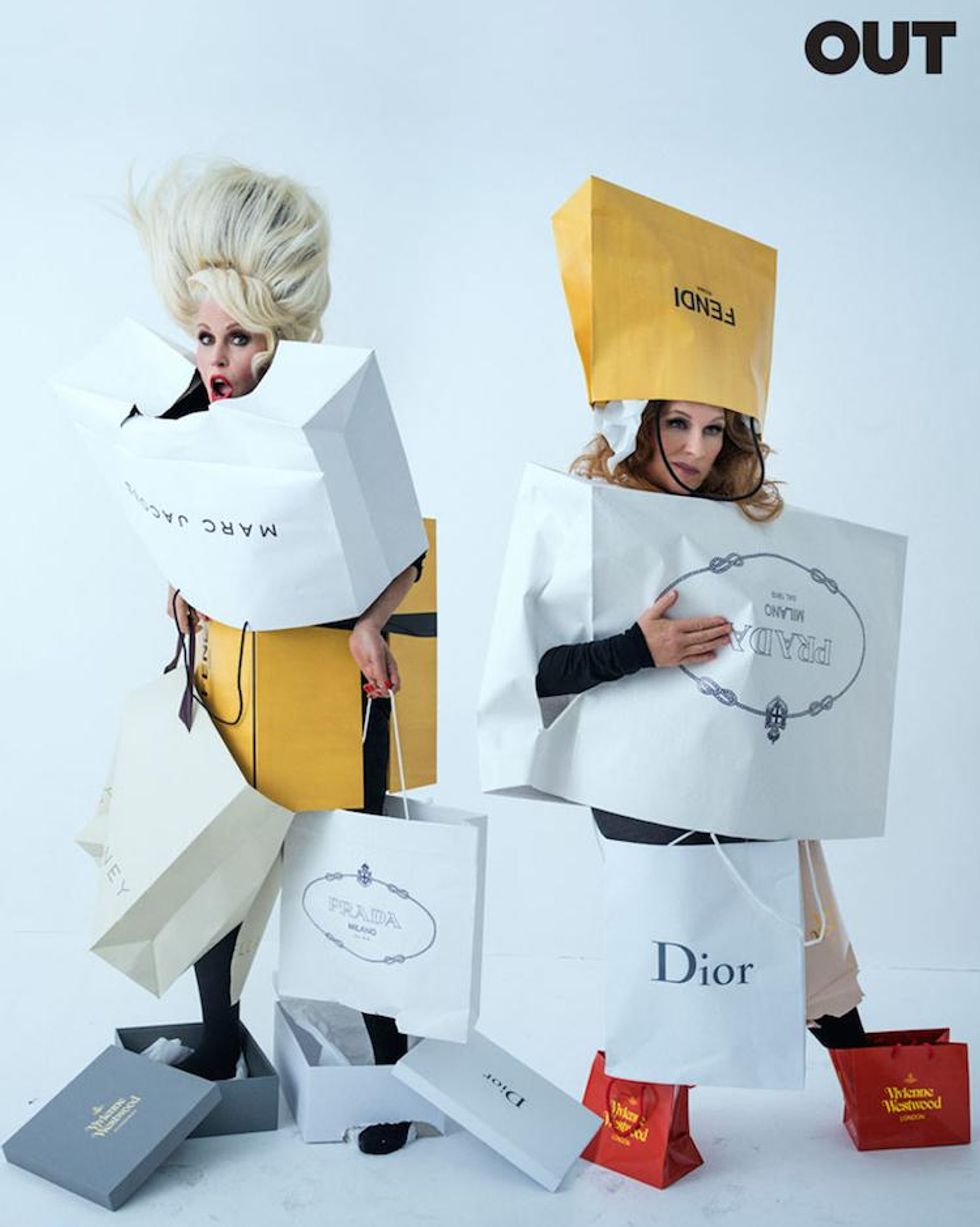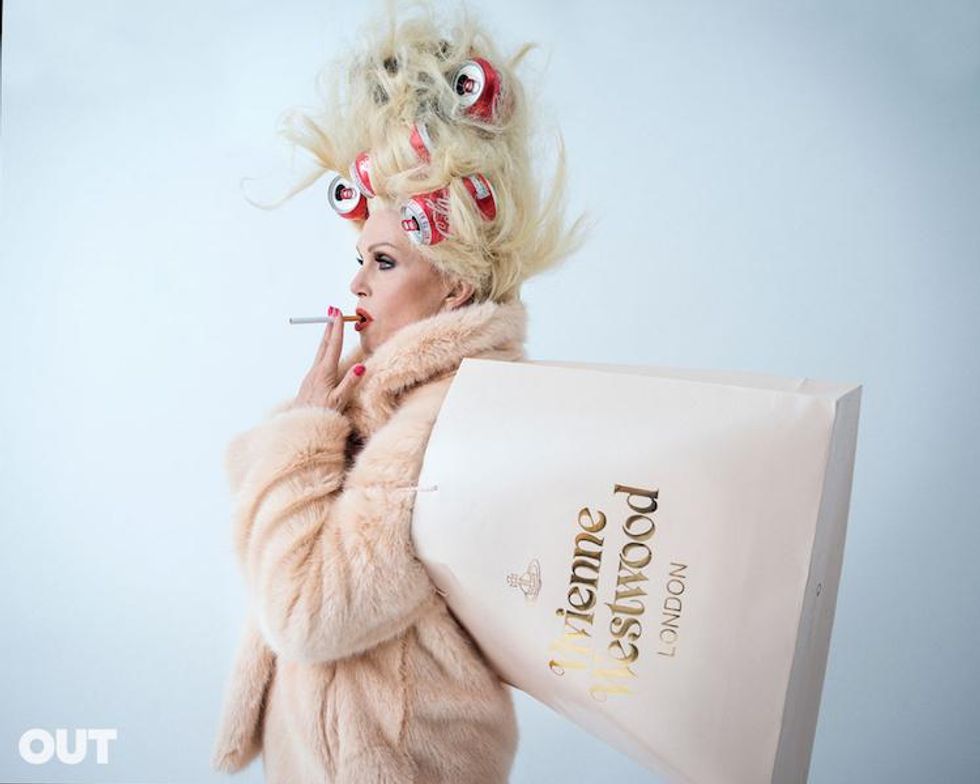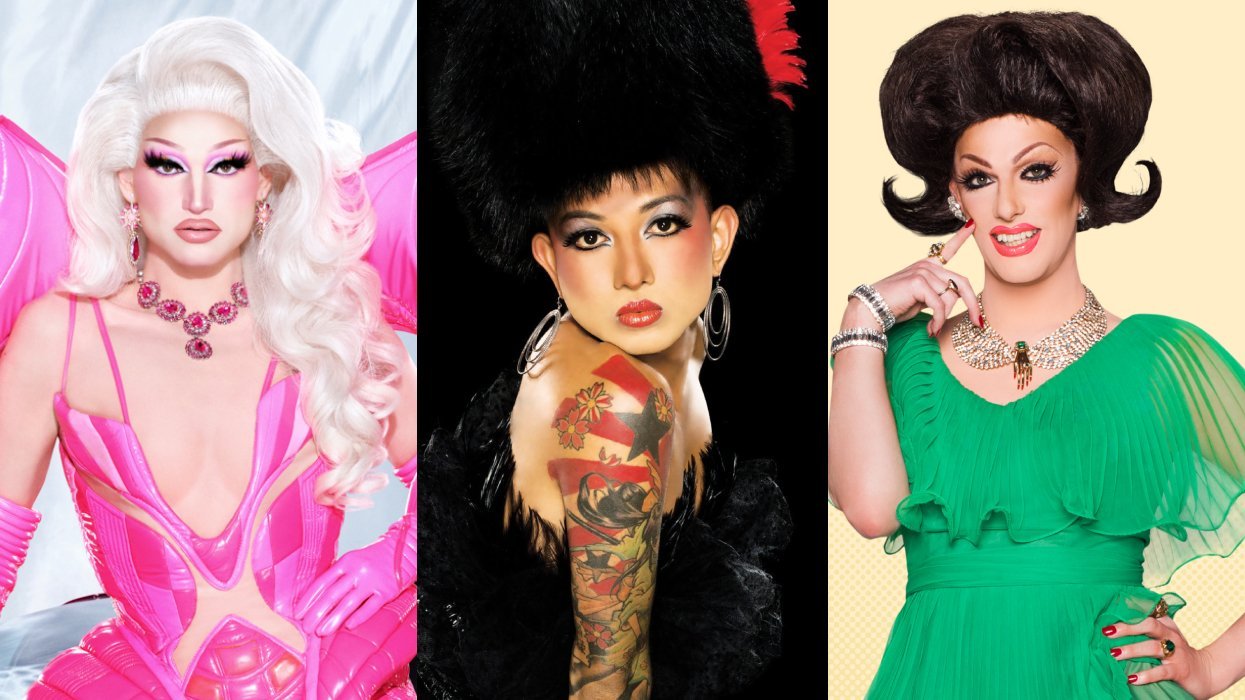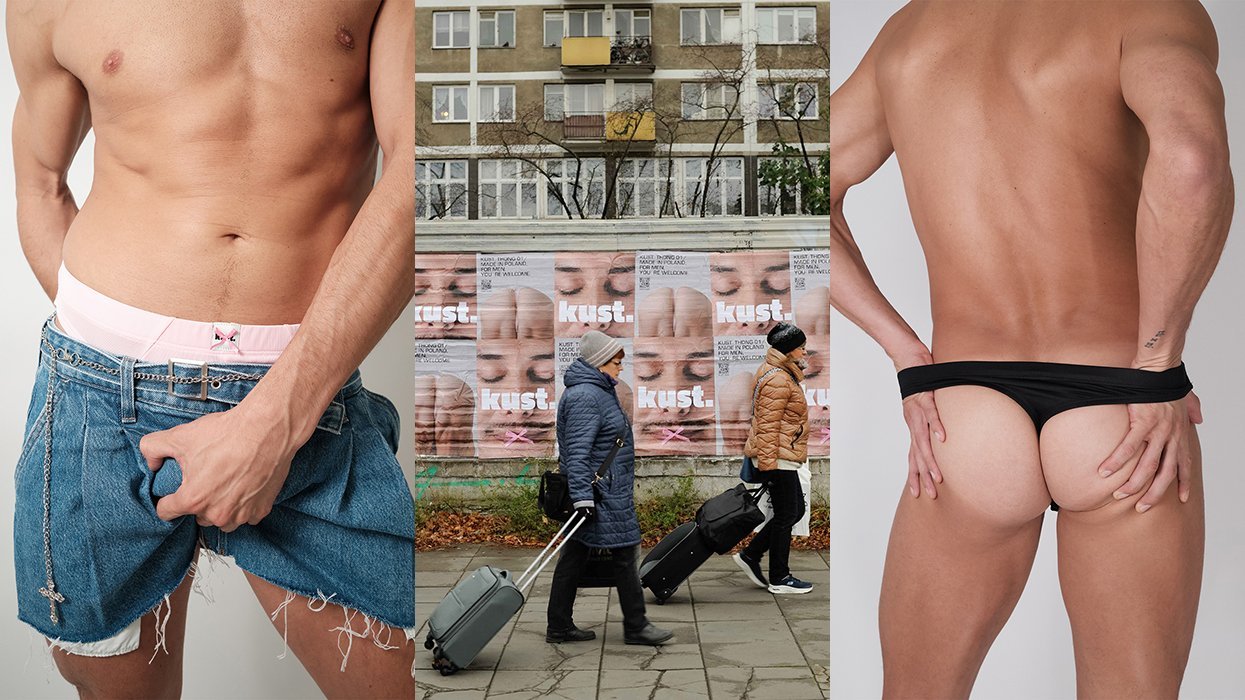Photography by Tim Walker.
After briefly contemplating a white wine spritzer, Jennifer Saunders opts for a glass of rose as we sit in the bucolic garden of Home House, a private club in west London. It is early summer and unseasonably warm. "I am a very good procrastinator," Saunders says above the polite hum of the city. "I am the Olympic gold-medalist of procrastination. People act as if there's something wrong with that. There isn't. You're just holding off from making a big mistake."
This is music to the ears of procrastinators everywhere who need reasons to defend their art. Prime exhibit for the defense: Absolutely Fabulous, a bitingly funny sitcom-on-steroids created by Saunders in which she and costar Joanna Lumley play coke-snorting, champagne-swilling avatars of materialism and vanity. The havoc they leave in their wake is total.
Ab Fab, as it's affectionately known to fans, launched in 1992 and ran in fits and starts for five seasons over 20 years -- an average of about one episode every six months. Now, finally, there is a movie, and you'd be forgiven for thinking that Saunders procrastinated until it was almost too late to make it: June Whitfield, who plays Mother, turned 90 during filming. Lumley is now 70, which only adds piquancy to her performance as Patsy Stone, an over-the-hill model-turned-fashion editor dementedly clinging to her youth. In the movie, Stone and Saunders's Edina Monsoon, a preposterous PR diva, are forced into hiding on the French Riviera after they're accused of accidentally killing supermodel Kate Moss.
Like a female version of Estragon and Vladimir in Samuel Beckett's Waiting for Godot, Stone and Monsoon are utterly dependent on each other, unable and unwilling to admit defeat as the world passes them by. As in Godot, very little happens. They drink a lot. They lunch. They take excursions, to, say, find a particular doorknob in New York City. They drink some more. The rare times we see them at work simply emphasize how utterly unfit they are. Edina is apt to bark inane commands at her hapless assistant Bubble, along the lines of "More blog... I want 'My favorite cheese' -- that sort of thing," while Stone's approach to editing a fashion magazine is summed up in a mood board she dictates to her assistant, Alex: "Sex, bitch, aristo, sex, punk, whore, bitch, prossie, lezzie, punk, tart, slut. Oh, but Alex...Alex, with lovely shoes."
This is fitting. Ab Fab is a punk show. With lovely shoes.
Not surprisingly, gay men found much to identify with in this portrait of two ridiculous women refusing to relinquish their dance ticket. As with Lisa Kudrow's Valerie Cherish in The Comeback, it's the ways in which Edina and Patsy trade their dignity for relevance that is so painfully funny -- and sometimes just painful. In the movie, we get to see Edina experiencing a rare moment of lucidity. "It's all about being loved, being high-profile, everyone respecting her again because she's top of her game, and it all goes hideously wrong," says Saunders. "It's the first time, I think ever, that she and Patsy admit to knowing what she really is, which is this machine of consumerism, and she goes, 'All I've wanted is to keep the body going and now here I am just fat and old and hated.' It's my favorite moment."
Slideshow: Patsy and Edie, Movie Stars? We'll Be the Judge of That

There has always been something irresistible in watching mature women engage in pratfalls and slapstick. It's why we love Lucille Ball and Phyllis Diller. But Ab Fab pushed those boundaries by being both physical and transgressive. Monsoon has a straitlaced daughter, Saffy, who is forced to endure her mother's humiliations and bad behavior, a sly role reversal that resolutely refuses to give in to moral homilies on parental responsibility. In the film, Saffy is herself now a parent of a teenager, and we get to see this dysfunctional mother-daughter dynamic play out in a new generation. There is no salvation. The cycle continues.
"What makes our dynamic work is that we're not introspective characters, and we thrive off our dysfunction," says Julia Sawalha, who plays Saffy. "If you look at families, they very rarely improve themselves. You always revert back to the role you had when you were 15 or 16."
For years Saunders has fretted that a film would destroy the magic of the series. So what changed? "There's a point where you go, 'Fuck it, let's just do it,' " she says. "I suppose we just kind of miss them. For me and Joanna, they are alter egos in a way, and everyone keeps wanting a bit more. So I've tried to keep them going as they would keep going, rather than just go back to where they were. Even Joanna and I get tired of drinking and smoking." She pauses, before adding, "Of course, they still do that."
In some ways Ab Fab seems more of its time than ever, given the world of reality TV, Instagram, and Snapchat, which have turned so much of daily life into a kind of performance art. "For Edina it's all about aging and the modern world," says Saunders. "It's harder to get old now and still pretend you're young because of social media and stuff. Edina does take selfies in the film, but they're always shit. Luckily she never has her glasses on -- it's just a tiring, tiring thing."
The last time Ab Fab was on our screens, for a 2012 anniversary special, Saffy had just come out of prison for falsifying documents for asylum seekers. "There's a new disease called 'The Kardashians,' " Eddie told her, bringing her up to speed on what she'd missed during her time behind bars. Rumors that Kim Kardashian would have a cameo in the movie got short shrift from Saunders. "I don't want any crass people like her in it," she told reporters in May. But room has been made for plenty of other guest stars, including Kate Moss, Joan Collins, Jon Hamm, and Dame Edna Everage. And Glee's Chris Colfer gets to play the part of a lifetime as Edina's hairdresser/social media consultant, Christopher.
Colfer has been a fan of Ab Fab since the age of 6, and despite not knowing her, he randomly invited Saunders to attend a Glee concert in London in 2010. "We were playing at the O2 arena for a week, and I didn't know anyone there to give tickets to, so I reached out to Jennifer," he recalls. The two met backstage after the show, and Saunders casually mentioned she might be writing an Ab Fab movie and that Colfer should be in it. "It really could have been my Make-A-Wish," he says. "It was kind of trippy to be in a scene with the characters I'd loved for so long." (For her part, Saunders says, "He was absolutely wonderful in his role, as he had no hairdressing skills whatsoever.")
Colfer is among the few who have seen the 2009 pilot of an aborted adaptation of Ab Fab for Fox, one of two attempts to make a U.S. version -- the first, by Roseanne Barr for CBS, was to have featured Carrie Fisher, but it was apparently abandoned when it became clear that a PG version would not cut it. "There's always been so much talk about why an Ab Fab reboot couldn't work in the States, and I don't think Jennifer or Joanna get enough credit in those conversations, because it's Jennifer's writing, and her and Joanna's performance, that make it what it is," says Colfer. "They are truly the missing elements for an adaptation."
In some ways, though, Ab Fab has been remade -- as Broad City, which, intentionally or otherwise, channels the antic lunacy of Saunders's creation, albeit with a millennial spin. To watch Broad City's celebrated and brilliant "Hashtag FOMO" episode, in which Abbi and Ilana hop from party to party in an ever-more-desperate effort to be in the right place at the right time, is to see the ways in which the show expands on Ab Fab's ability to parody the zeitgeist. Colfer notes that both shows are built around the 'yes, and...' school of improvisation, in which each of the two central participants accepts the reality the other has created and adds to it. It helps, too, that in both cases the women involved do not allow ego or self-consciousness to hinder them. In her autobiography, Bonkers: My Life in Laughs, Saunders succinctly sums up comedy's appeal. "For me, [it] is about being allowed to be a child, to make things up and be silly. To play pretend and not be embarrassed in front of the person that you're playing pretend with."
The person Saunders chose to play pretend with first was Dawn French. The two met at a teachers college in the late 1970s and quickly found a knockabout formula that showcased their endless capacity for physical comedy, with them graduating from an act called the Menopause Sisters to the Menopazzi Sisters, a pastiche of an old Italian circus act that involved much bowing. That led, eventually, to a gig at London's then-nascent Comic Strip Club, where they joined a generation of young anarchic stand-ups. It was the beginning of what was known as alternative comedy, a genre that consciously did not trade in sexism or xenophobia.
For Saunders, the cement of everything she and French did together was their friendship, a critical part of what made them so enjoyable to watch as they began their ascent as one of Britain's great comedy duos, honing their skills in a long-running BBC show, French & Saunders, in which they manically lampooned pop culture, re-creating everything from The Shopping Channel to The Matrix to Madonna.
"French & Saunders was literally being let loose in the dressing-up box and coming up with whatever we wanted," recalls Saunders. "We did a lot of gay divas."
Ab Fab has its roots in a 1990 sketch that Saunders created with French. The segment lasted around eight minutes and featured Saunders as a hyperventilating and obstreperous mother trying to persuade her studious daughter (French) on the merits of marijuana, Botox, and Andy Warhol's diaries. It was a few years later, when French & Saunders was on hiatus, that Saunders thought of turning the sketch into the basis of a sitcom, writing the pilot in a lined notebook -- the only time she ever wrote a complete script on time, she says. "At the beginning it was all about Saffy and Edina, because when I first wrote it, Patsy was a sort of add-on character who supported Edina in her awfulness," she says. "But actually I just love working in a double act."
Saunders had seen Lumley playing herself as an alcoholic has-been on another comedy show helmed by her friend (and later Ab Fab script editor) Ruby Wax, and she invited her to read for the role. It turned out to be a masterstroke. Lumley's brilliant comic instincts were a surprise to viewers familiar with her 1970s and early-'80s roles in TV series such as The New Avengers and Sapphire and Steel, both of which could be described as British prototypes for The X-Files, only with poorer production values. "She is astounding," says Saunders. "Even in the film she pulls expressions that I never saw at the time. It wasn't that she didn't do comedy; it was that no one expected her to because she has this otherworld loveliness, this poise. I always notice that when people imitate Patsy, they go for the degraded Patsy, but actually most of the time she is beautifully turned out, beautifully dressed. Edina is a mess, but Patsy is always immaculate -- the hair is up, the earrings are in. Just occasionally she turns into Eurotrash."
Slideshow: Patsy and Edie, Movie Stars? We'll Be the Judge of That

Coat by Stella McCartney.
Enter Lumley. It is another sunny day in London, and she has wandered in from her garden. Largely regarded as something of a national treasure, she fought a tireless campaign to secure for Gurkha veterans (Nepalese soldiers who had served in the British army) the right to settle in the U.K., and she has lately been in the news again for spearheading a new garden bridge across the Thames. She is, in other words, a born do-gooder, a far cry from the character she plays. Her early modeling career and life as a New Avenger, compounded by her colonial upbringing, have long solidified her in the public imagination as what Brits might call "posh totty," a perception she simultaneously magnifies and trashes in Ab Fab. "It's very liberating to be able to act and speak as grotesquely as Patsy does," Lumley says. "She's so uncaring about everything, so furious and so demanding and so funny. I think what attracts both of us to these characters, and why we love them so, is that they're so ridiculous."
It's impossible to imagine Ab Fab with anyone but Lumley playing Patsy. For starters, no one can fall quite like her. (For evidence, search YouTube for the scene in which a drunken Patsy tips over into a grave.) But it is also her comedic timing, the way she can turn a laugh into a snarl, and her skill for deadpan delivery. "I was a clown at home, a clown at school," she says. "I've never laughed at other people -- it's not in my nature -- but when the object of derision is yourself, there's nothing you can't do, really." This, finally, might be the secret of the show's success: self-deprecation. It's both a British quality and a particularly female instinct. Talk to the cast of the show, and the overwhelming impression you come away with is their collective humility and warmth. "I've always loved the fact that there's no ego in the group, never that kind of thing of, 'That's going to upstage me if you do that,' " says Sawalha. "We're all generous actors and good listeners."
For both Lumley and Saunders, the show works in large part because women are front and center. "It hasn't got any of that man-woman love," says Lumley. "It's got a different love, which I think people recognize, and is the oldest and in some ways truest love of all -- the love of friends." Men are peripheral at best. "I think they're happy being who they are with each other, and it doesn't rely on a safe heterosexual relationship at the center of it," says Saunders. "There was one moment when Edina nearly got a boyfriend, but just as she's about to get a shag, she looks over and sees Patsy under the sofa."
For Lumley, who played the male Shakespeare leads at school because of her height, one of the joys of playing Patsy is her utter indifference to gender, including, it seems, her own. "Although she is a woman, she did take hormones and then went down to Morocco, had something stitched on, and after about a year it withered away and fell off," Lumley recalls. "She stopped taking hormones and turned back into a woman."
Lumley is referring to a bonkers episode from 1994 in which Patsy and Edina are robbed in Morocco and sell Saffy to white slavers. Would a plot like that fly today? Maybe not. Saunders, who counts Joan Rivers and Richard Pryor among her heroes, worries that contemporary comedy is undergoing a failure of nerve. "In the beginning you were allowed to offend people much more," she says. "Now people are up in arms if you say the wrong thing by mistake even if you are trying to be on their side. Suddenly everyone has become an army of haters. Is it the power of Twitter? Let's loosen up, otherwise it's all going to be so black-and-white. The truth is that people shouldn't be offended by Patsy and Edina, because they represent people who are offensive. These aren't role models -- they are not saying what I think. They're just who they are -- great big mouths. They are natural offenders. That's their job."
Slideshow: Patsy and Edie, Movie Stars? We'll Be the Judge of That
Like what you see here? Subscribe and be the first to receive the latest issue of Out. Subscribe to print here and receive a complimentary digital subscription.
